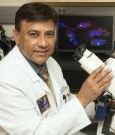Kenneth S. Ramos, MD, PhD, PharmB, has been named the new MD-PhD Program Director at the University of Arizona College of Medicine, Tucson. The Program was established in 1990 to provide dual training in medicine and research to students interested in careers as research-intensive physicians working in the public and private sectors.
Dr. Ramos, Associate Vice President of Precision Health Sciences and Professor of Medicine, will work closely with members of the MD-PhD Committee, the UA Graduate College, UA Admissions Committee, the Office of Diversity and the College of Medicine, Phoenix to increase recruitment and retention of outstanding scholars into the program.
“The [University of Arizona] is committed to building the pipeline of future physician-scientists,” says Dr. Ramos, who with support from the Arizona Health Sciences Center Office of the Senior Vice President for Health Sciences, will invest additional resources to ensure the growth and sustainability of the program with unparalleled education along with tools to establish a rewarding career in medicine by combining the discovery of new knowledge with the practice of clinical medicine.
Dr. Ramos is an expert in genomics and predictive biology and environmental and molecular medicine and toxicology. He has received more than $50 million in research funding, including R01, P01 and P30 grants, and has made seminal contributions in the areas of molecular toxicology, environmental health sciences, toxicogenomics, and molecular medicine.
An expert in the study of gene-gene and gene-environment interactions and genomic medicine, his research program integrates diverse approaches, ranging from molecular genetics to population-based public health studies to understand the genetic and genomic basis of human disease and to advance the goals of precision medicine. Ongoing basic science studies in his laboratory focus on repetitive genetic elements in the mammalian genome and their role in genome plasticity and disease, while his clinical work focuses on the characterization of diagnostic and prognostic biomarkers for chronic disease and cancer. ■


